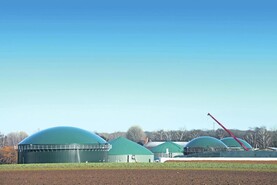Tillage and beef farmer from Durrow, Co Laois, Séamus Duggan, believes that anaerobic digestion won’t be an option for the vast majority of farmers.
“I think [AD] is a solid waste of time for 99% of the farmers here, because none of us could afford it. The solar and biomass were probably the only aspect that was really of any relevance for an Irish farmer.
“From the perspective of supplying these AD plants, I need every bit of slurry I have – I’m putting it back into crops and putting it back into what I’m doing myself.
“A farmer summarised it out there tonight – I can get €40/bale for silage, why would we even consider going to an AD plant? I don’t see an awful lot of viability in it,” he said following the Irish Farmers Journal Renewables Roadshow in Kilkenny.
Joe and Tony Palmer, also from Durrow, attended the Kilkenny renewables roadshow because they’re interested in solar panels.
“That anaerobic digestion is a rich man’s game. We’d like to be able to cover our own bills by putting in solar panels and be self-independent.
“Suppose the electricity went off for a couple of weeks for some reason – you’d have your own.
“The solar from your roof is guaranteeing you a price for the next 20 or 30 years, so you might be paying 25c [for electricity] now, but what comes off the roof is 8c or 9c, so when you look at it from that point of view, from that perspective, they make total sense.
“So rather than talk about payback, you should say would you rather not buy power for 9c – and that’s guaranteed for 20 years and it’s security of your bills, which has never been there before.”
John Molloy, a young beef farmer from Ballingarry, south Tipperary, said that he is interested in solar panels.
“I’m looking to see how I can save money on the farm and how I can reduce the ESB bill somehow. I’d be interested in putting solar panels either on the shed or on the ground and I want to find out more about planning permission for that basically.”
Meath farmer Christopher Gibney said he is looking more at AD.
“It has to be farmer orientated, the farmer has to get something out of it. If not, it’s not going to work. It is a huge investment, even just for planning. But there is an opening there if the capital grants come. They would have to be 40% or you will be wasting your time.
“If it isn’t, the money will have to come from the gas industry buying and they will only pay so much.
“The biggest problem we have is the youth are not interested in farming. If they had something they could see a steady income coming from, I think they would come back.”






 This is a subscriber-only article
This is a subscriber-only article










SHARING OPTIONS: